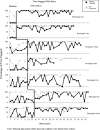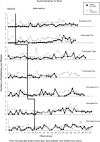Promoting Social Learning at Recess for Children with ASD and Related Social Challenges
- PMID: 29556445
- PMCID: PMC5843568
- DOI: 10.1007/s40617-017-0178-8
Promoting Social Learning at Recess for Children with ASD and Related Social Challenges
Abstract
The school playground provides an ideal opportunity for social inclusion; however, children with autism spectrum disorder (ASD) often struggle to engage in appropriate social interactions in this unstructured environment. Thus, they may spend recess time alone. The FRIEND Playground Program is a structured, play-based intervention aimed at improving social interactions of children with ASD and other social challenges during recess. The current research study employed a multiple baseline across participant design to systematically evaluate whether this intervention yields increased social engagement and initiations with peers during recess. Seven participants with ASD or other social challenges received 20 min of direct intervention from trained playground facilitators during school recess each day. Results suggest that the FRIEND Playground Program produced meaningful increases in social engagement and social initiations from baseline among participants with ASD and other social challenges.
Keywords: Autism spectrum disorders; Peer interaction skills; Recess; Social skills training.
Conflict of interest statement
Compliance with Ethical StandardsAll procedures performed in studies involving human participants were in accordance with the ethical standards of the institutional and/or national research committee and with the 1964 Helsinki Declaration and its later amendments or comparable ethical standards.Informed consent was obtained from all individual participants included in this program. Institutional Review Board (IRB) approval was obtained to publish de-identified data from this program evaluation.Lori Vincent declares that she has no conflict of interest. Daniel Openden declares that he has no conflict of interest. Joseph Gentry declares that he has no conflict of interest. Lori Long declares that she has no conflict of interest. Nicole Matthews declares that she has no conflict of interest.
Figures
Similar articles
-
Children with autism spectrum disorder and social skills groups at school: a randomized trial comparing intervention approach and peer composition.J Child Psychol Psychiatry. 2016 Feb;57(2):171-9. doi: 10.1111/jcpp.12460. Epub 2015 Sep 22. J Child Psychol Psychiatry. 2016. PMID: 26391889 Clinical Trial.
-
The games they play: Observations of children with autism spectrum disorder on the school playground.Autism. 2019 Aug;23(6):1343-1353. doi: 10.1177/1362361318811987. Epub 2018 Nov 9. Autism. 2019. PMID: 30413135 Free PMC article.
-
Peer-Mediated Intervention for the Development of Social Interaction Skills in High-Functioning Autism Spectrum Disorder: A Pilot Study.Front Psychol. 2016 Dec 23;7:1986. doi: 10.3389/fpsyg.2016.01986. eCollection 2016. Front Psychol. 2016. PMID: 28066303 Free PMC article.
-
Peer-mediated theatrical engagement for improving reciprocal social interaction in autism spectrum disorder.Front Pediatr. 2014 Oct 10;2:110. doi: 10.3389/fped.2014.00110. eCollection 2014. Front Pediatr. 2014. PMID: 25346926 Free PMC article. Review.
-
Computer- and Robot-Assisted Therapies to Aid Social and Intellectual Functioning of Children with Autism Spectrum Disorder.Medicina (Kaunas). 2019 Aug 5;55(8):440. doi: 10.3390/medicina55080440. Medicina (Kaunas). 2019. PMID: 31387274 Free PMC article. Review.
Cited by
-
Narrative Review of the Theoretical-Methodological Foundations of the TREINI Program.Children (Basel). 2024 Sep 27;11(10):1181. doi: 10.3390/children11101181. Children (Basel). 2024. PMID: 39457146 Free PMC article. Review.
-
Theoretical-Methodological Foundations for the Global Integration Method (Método de Integração Global-MIG) in the Treatment of Autism Spectrum Disorder.Children (Basel). 2024 Feb 2;11(2):191. doi: 10.3390/children11020191. Children (Basel). 2024. PMID: 38397303 Free PMC article. Review.
-
Social participation for students with special needs in inclusive schools: a scoping review.Int J Dev Disabil. 2023 Dec 4;71(5):643-662. doi: 10.1080/20473869.2023.2277602. eCollection 2025. Int J Dev Disabil. 2023. PMID: 40687535 Free PMC article. Review.
-
Closing the Gap Between Theory and Practice: Conceptualisation of a School-Based Intervention to Improve the School Participation of Primary School Students on the Autism Spectrum and Their Typically Developing Peers.J Autism Dev Disord. 2022 Jul;52(7):3230-3245. doi: 10.1007/s10803-021-05362-5. Epub 2021 Dec 4. J Autism Dev Disord. 2022. PMID: 34862953 Free PMC article.
-
Evaluating the effectiveness of a reverse inclusion Social Skills intervention for children on the Autism Spectrum.J Autism Dev Disord. 2023 Jul;53(7):2647-2662. doi: 10.1007/s10803-022-05513-2. Epub 2022 Apr 20. J Autism Dev Disord. 2023. PMID: 35441915
References
-
- American Psychiatric Association . Diagnostic and statistical manual of mental disorders. 5. Washington, DC: Author; 2013.
-
- Baker MJ, Koegel RL, Koegel LK. Increasing the social behavior of young children with autism using their obsessive behaviors. The Journal of the Association of for Persons with Severe Handicaps. 1998;23:300–308. doi: 10.2511/rpsd.23.4.300. - DOI
-
- Bellini S, Peters JK, Benner L, Hopf A. A meta-analysis of school-based social skills interventions for children with autism spectrum disorders. Remedial and Special Education. 2007;28(3):153–162. doi: 10.1177/07419325070280030401. - DOI
LinkOut - more resources
Full Text Sources
Other Literature Sources



